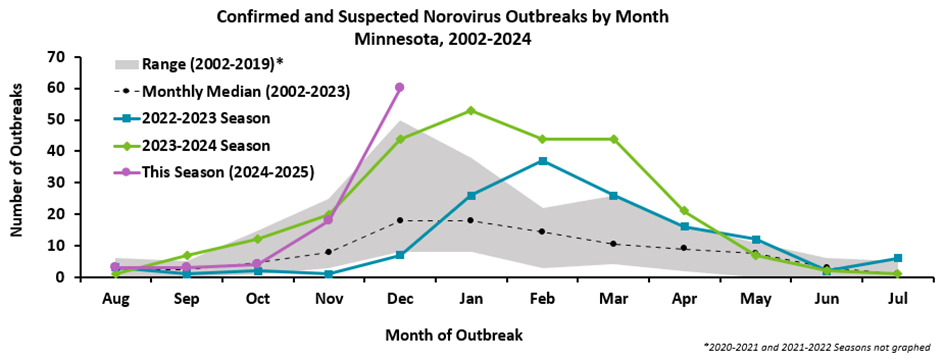Spike in norovirus numbers not likely to end soon, Minnesota health officials say
MINNEAPOLIS — Norovirus numbers in Minnesota remain "higher than usual" and likely will for some time, state health officials said Tuesday.
According to the Minnesota Department of Health, there were more than 60 outbreaks totaling over 1,100 individual cases in December. That's about three times as many outbreaks as is typical for this time of year, the department said.
Going back to 2002, the average number of outbreaks annually in the state is about 18, and that's not counting individual cases.
The health department said its numbers represent "a very small fraction of all norovirus cases that are occurring in Minnesota."
"We do not, for example, hear about outbreaks within families," the department said. "What we are seeing is therefore an overall picture of norovirus activity, but many more Minnesotans have become ill with norovirus than get counted in our numbers."
Hennepin Healthcare pediatrician Dr. Krishnan Subrahmanian says his hospital is seeing cases "in droves."
"We're seeing it all over the community, all over town. I would say it's the No. 1 concern and complaint I'm getting these days in my inbox and in my clinic," Subrahmanian said.
Norovirus is a highly contagious stomach bug, starting with food contaminated with fecal material that can spread by touching people and objects and sharing food or drinks.
Hand sanitizers can't kill norovirus, so it's all down to old-fashioned handwashing.
"We're washing hands with regularity, and I almost might put on my clock at every hour, we're just going to wash our hands," Subrahmanian said.
Symptoms include severe vomiting, diarrhea and stomach cramps. It typically resolves within one or two days without long-term effects, though if your symptoms last longer, you should seek medical care. The best treatment is to drink plenty of fluids.
The increase in norovirus cases in Minnesota is mirrored nationally, according to the Centers for Disease Control. Locally, officials don't expect the illness to slow down any time soon.
Local health officials say this season's cold temperatures, keeping more people together indoors, is a major reason for the spread.
"Norovirus illnesses have a winter seasonality, so we expect to continue to see outbreaks reported to the Minnesota Department of Health for at least the next several months," a health department spokesperson said.










